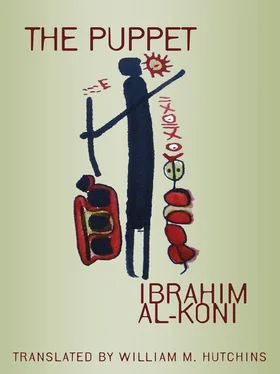Ibrahim al-Koni - The Puppet
Здесь есть возможность читать онлайн «Ibrahim al-Koni - The Puppet» весь текст электронной книги совершенно бесплатно (целиком полную версию без сокращений). В некоторых случаях можно слушать аудио, скачать через торрент в формате fb2 и присутствует краткое содержание. Год выпуска: 2015, Издательство: Center for Middle Eastern Studies, University of Texas, Жанр: Современная проза, на английском языке. Описание произведения, (предисловие) а так же отзывы посетителей доступны на портале библиотеки ЛибКат.
- Название:The Puppet
- Автор:
- Издательство:Center for Middle Eastern Studies, University of Texas
- Жанр:
- Год:2015
- ISBN:нет данных
- Рейтинг книги:3 / 5. Голосов: 1
-
Избранное:Добавить в избранное
- Отзывы:
-
Ваша оценка:
- 60
- 1
- 2
- 3
- 4
- 5
The Puppet: краткое содержание, описание и аннотация
Предлагаем к чтению аннотацию, описание, краткое содержание или предисловие (зависит от того, что написал сам автор книги «The Puppet»). Если вы не нашли необходимую информацию о книге — напишите в комментариях, мы постараемся отыскать её.
The Puppet — читать онлайн бесплатно полную книгу (весь текст) целиком
Ниже представлен текст книги, разбитый по страницам. Система сохранения места последней прочитанной страницы, позволяет с удобством читать онлайн бесплатно книгу «The Puppet», без необходимости каждый раз заново искать на чём Вы остановились. Поставьте закладку, и сможете в любой момент перейти на страницу, на которой закончили чтение.
Интервал:
Закладка:
Then the Conscript threw himself into the river Chou’s waters and drowned.
The Ruler had recourse to the Sage of Dark Light, meaning to abdicate. … The latter said, “Seizing power is wrong. Killing one’s subjects is a desecration of the law of compassion. Committing a crime for personal gain makes one an ignoble person. I’ve heard that it’s inappropriate to enter the land of a man who lacks the Tao. So how can I allow others to honor me? Oh, I can’t take any more.”
Then the Sage of Dark Light rose and, strapping a rock to his body, threw himself into the river Lu.
Chuang Tzu, “Abdication,” The Book of Chuang Tzu, fourth century BCETHE SHE-JINNI
1
Since its founding, the oasis has received many people, and clans from the desert’s four corners have settled there. Its walls have sheltered unknown wayfarers — most of them men but a few women as well. Some were excellent folks and others vile ne’er-do-wells. Among them were well-adjusted individuals; others conducted themselves in an eccentric way, exhibiting aberrant behavior.
It is said that this difference in qualities and defects of natures was typical not only of the men of these nomadic races but also of some of the women. Informed sources agree that Waw never experienced a creature more seditious or one who aroused greater agitation and curiosity than the lone female traveler whom narrators called the Mute Soprano.
Local history buffs say she arrived from the south and entered Waw at twilight, through the Oases Gate. Her timing fed the conviction that this visitor had no ties of kinship with the desert’s people and was instead a she-jinni and the daughter of the Spirit World, because the tribe normally considered guests arriving at twilight to be jinn cloaked in human garb. The inhabitants of the oasis had inherited from their forefathers beliefs affirming that every creature that stirs at those frightening moments just before sunset is kin to the Spirit World’s inhabitants.
She appeared alone, and no woman had ever arrived in the settlements of the oasis in this way before. By coming alone, she lent credence to the assertion, based on the soundest authority, that she was related to the noblest jinn. Unlike all the foreign women who had journeyed there before her, she was not accompanied by a spouse or relatives or attended by slaves or female servants.
She arrived on the back of a fearsome, short, well-nourished, large-mouthed, thick-haired camel with a crazed look in its eyes. Children joked about its appearance and repeated in unison that it was a jinni’s steed bearing the daughter of the jinn.
On the behemoth’s back was fastened a howdah that astonished everyone who saw it. The frame was composed of polished ribs bound together. Experts affirmed that these were cut from the tusks of an elephant slain by an ignoble hand. Woven around the arches of these curved beams were animal skins. Coverings of colorful, pure linen, which was decorated with embroidery of tiny beads of many hues, were braided around sheaths. Small white beads adorned the dark linen hangings and red ones embellished braided strips brightened by light colors. Thus the whole construction had been transformed into an extraordinarily beautiful masterpiece around which children hovered while the women gathered to inspect it. The men’s eyes were refreshed as they admired and contemplated it, trading compliments for it. They eventually agreed that the ensemble was a verse of poetry and not a howdah at all.
Skeptics were quick to find in the howdah’s beauty new evidence for their claim about the visitor’s lineage. On peering beneath the saddle to scrutinize this marvel, they discovered that the howdah was attached to the body of the fearsome behemoth by leather belts that had dried into its skin after encircling the belly, thus making it impossible to remove the howdah, which had adhered to the camel’s back, becoming one with its flesh, as if it were an extension of the hump on which it sat. The behemoth puffed out its jowls and cast furious glances from its angry eyes at the curiosity seekers, as if it were a hostile jinni. Then it went off to graze in the woods of the southern sector, without the howdah ever leaving its hump.
2
They scrutinized her figure the moment she dismounted. She had a heavenly build, a firm body, and a relatively slender torso. Her complexion was pure, untouched by the darkness of the southern tribes, and the features of her face had a sweet charm. She had bright red cheeks, and a mysterious, delicate smile glittered in her green eyes. She was clad in a flowing blue gown, and the inhabitants of the oasis immediately noticed her silence.
They stepped forward to meet her and caused her frightening camel to kneel. They showered her with the sweet compliments customarily reserved for nobles and leaders, but she did not respond to their greeting with even a word. Instead she granted the throngs surrounding her an enigmatic glance. She smiled at the children in a sibylline way desert people find only among the female jinn.
She did not favor them with this smile for long.
The stern look they had noticed when she arrived returned to her enchanting green eyes along with the sad expression so typical of wanderers and foreigners. Her pupils retained the hint of her smile, but the gleam was extinguished as a painful reserve settled over her eyes, which lost none of their beauty as a result of this change. In fact, their seductive look was reinforced. Mystery flashed from them, their enchantment increased, and beauty’s tyranny became more complete.
At this moment, people heard that voice.
It was a voice never before heard in the desert.
People were at a loss when they tried to think of a comparable sound. It was likened to the rustling of a calm breeze through retem boughs. It was said to be a strange, muffled wail. Others declared that it resembled more closely the groan of misfortunes.
The painful moan began as faintly as the distant drone of a fly. Then it drew nearer and grew louder and mightier until it filled every ear. People’s breasts were convulsed by worries they had never before experienced. Mystics were inflamed by the sweetest forms of longing, and tears flooded all eyes. The oasis shook, cavaliers reeled, and hearts felt drained. Some became so intoxicated that they fell from the roofs of their homes. In musically induced ecstasy, men and women began writhing in ditches. Some were so overcome by grief that they drew their swords and stabbed themselves. Another group lost their minds; they sang a little and then went insane.
The melodies of the beautiful woman, who communicated only through song, were lethal.
3
They embraced the she-jinni.
They erected tents for her out in the open and slaughtered animals for feasts. The women of the tribes gathered around her, and at evening parties female poets sang for her the refrains of eternally lost souls. Old women kept her company at celebrations of the full moon. She would furtively cast a grateful look at people and then gaze off into a maze of emptiness while summoning to her chest the lethal voice that would almost have destroyed the tribe’s mounted warriors had the temple’s woman diviner not directed the tribe’s nobles to use drums to drown out the melody. A troupe of young women cradling wooden drums with skin heads surrounded the foreigner’s daughter, who paid no attention to the commotion till the girls’ fingers began to beat the drums so loudly that the plaza resounded. Then the pounding drums cut short the tongues’ clamor and swallowed the breasts’ growls.
The planets, however, went down different alleys, and the stars swiftly changed places and entered ill-omened houses. The diviners’ blind eyes saw Saturn slip over to dwell in Pisces’s tower and Venus leave her territories to station herself in Scorpio’s home. So the open spaces were flooded with the cunning of the celestial bodies, and iniquity lodged in the oasis’s settlements. Then people were awakened by a wail that rocked their buildings’ pillars and hearts were penetrated by a desolation they had never known before. Once more male poets began to stab themselves and female poets threw themselves off the tops of walls. This occurred because the foreigners’ daughter had been insulted; the horizons resounded with this calamity’s wail.
Читать дальшеИнтервал:
Закладка:
Похожие книги на «The Puppet»
Представляем Вашему вниманию похожие книги на «The Puppet» списком для выбора. Мы отобрали схожую по названию и смыслу литературу в надежде предоставить читателям больше вариантов отыскать новые, интересные, ещё непрочитанные произведения.
Обсуждение, отзывы о книге «The Puppet» и просто собственные мнения читателей. Оставьте ваши комментарии, напишите, что Вы думаете о произведении, его смысле или главных героях. Укажите что конкретно понравилось, а что нет, и почему Вы так считаете.












